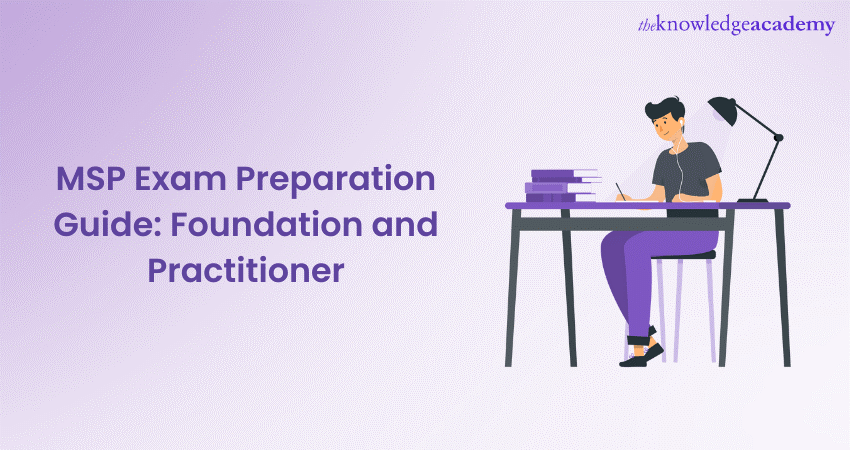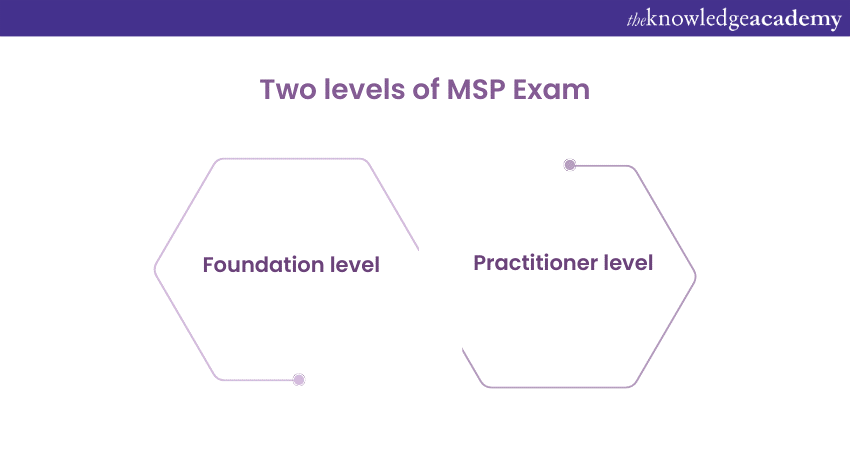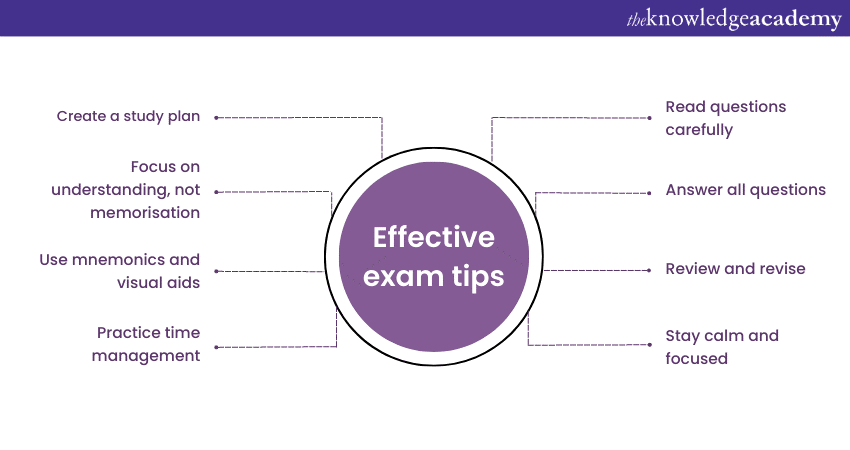We may not have the course you’re looking for. If you enquire or give us a call on +44 1344 203 999 and speak to our training experts, we may still be able to help with your training requirements.
Training Outcomes Within Your Budget!
We ensure quality, budget-alignment, and timely delivery by our expert instructors.

The MSP exam assesses your understanding and application of the MSP framework, principles, and concepts. It consists of two levels: Foundation and Practitioner. The Foundation level evaluates your knowledge of the fundamental MSP principles, while the Practitioner level tests your ability to apply those principles to real-world scenarios.
Preparing for the Managing Successful Programmes or MSP Exam can be a difficult task, but with the right approach and study plan, you can significantly improve your chances of success. This includes familiarising yourself with the MSP concepts, studying the framework in detail, practicing with sample questions, and reviewing your knowledge at both the Foundation and Practitioner levels.
This blog aims to help you structure your preparation for the MSP Exam, focusing specifically on the Foundation and Practitioner levels.
Table of Contents
1) MSP Exam details
2) Preparation for Foundation level
3) Preparation for Practitioner level
4) Effective exam strategies
5) Conclusion
MSP Exam details
The MSP exam evaluates your comprehension and application of the MSP framework, principles, and concepts. If you wish to ace the examination, it is crucial to have a clear understanding of its format and objectives.
The MSP exam consists of two levels - Foundation and Practitioner – and each level assesses different aspects of your knowledge and skills related to program management. Both levels of the exam have specific time limits, and it's crucial to manage your time effectively to ensure you can complete all questions within the allocated time.
The Foundation level serves as an introduction to MSP, testing your understanding of the basic principles and terminology. It lays the groundwork for more advanced concepts covered at the Practitioner level. Let's look at both these levels in detail:

Foundation level
The Foundation level exam typically comprises multiple-choice questions that assess your familiarity with MSP terminology, key concepts, and the overall framework. It tests your ability to recall information and apply basic MSP principles in various scenarios. A solid understanding of the Foundation level content is crucial as it forms the foundation for your progression to the Practitioner level.
Practitioner level
The Practitioner level exam, on the other hand, focuses on your ability to apply MSP principles in complex real-world situations. It requires a deeper comprehension of MSP concepts, including how to tailor and adapt the framework to specific program management scenarios. The Practitioner level exam often includes scenario-based questions and case studies that challenge your analytical thinking and decision-making skills.
Unlock your potential in program management with our MSP® Training Courses today!
Preparation for Foundation level
Preparing for the Foundation level of the MSP exam requires a systematic approach to building a strong understanding of the fundamental principles and concepts of MSP. The following steps can help you prepare for the exam effectively:
1) Learn the MSP concepts: It is essential to immerse yourself in the key concepts and terminology of MSP. You must clearly understand terms such as program, projects, stakeholders, benefits realisation, and risk management. This foundational knowledge will provide a solid basis for your further learning.
2) Study the MSP framework: Dive into the MSP framework and explore its structure, processes, and governance themes. Familiarise yourself with the roles and responsibilities of different stakeholders within the framework. Understand how MSP provides a structured approach to managing successful programs and how it aligns with broader organisational objectives.
3) Practice with sample questions: To assess your understanding of the Foundation level content, practice with sample questions. Numerous resources offer mock exams and practice papers tailored specifically for the MSP Foundation exam. By answering these questions, you can test your knowledge, identify any knowledge gaps, and gain familiarity with the exam format.
4) Seek accredited training: Consider enrolling in accredited MSP Foundation training courses. These courses provide in-depth instruction, guided exercises, and valuable insights from experienced trainers. Accredited training ensures you receive accurate, up-to-date information aligned with the exam syllabus.
Ready to establish a strong foundation in MSP? Sign up for our MSP® Foundation Course now!
Preparation for Practitioner level
Building upon the foundation established in the Foundation level, the Practitioner level dives deeper into the application of MSP principles in complex program management scenarios. Here are key steps to help you effectively prepare for the Practitioner level exam:
1) Review foundation-level knowledge: Before delving into the Practitioner level content, review and reinforce your understanding of the Foundation level knowledge. Ensure you have a solid grasp of the basic MSP concepts, principles, and the MSP framework.
2) Learn advanced MSP concepts: At the Practitioner level, you must demonstrate a deeper understanding of MSP concepts and their practical application. Study advanced topics such as leadership and stakeholder engagement, governance, risk management, etc. Explore how these concepts integrate with the overall program management process and understand their impact on successful program outcomes.
3) Solve complex case studies: The Practitioner level exam often includes complex case studies that require critical thinking and the ability to apply MSP principles in real-world scenarios.
Practice solving these case studies to enhance your analytical skills and develop your ability to make informed decisions within the MSP framework. Seek resources that provide sample case studies and their solutions to gain exposure to various program management challenges.
4) Utilise official MSP guidance: Refer to official MSP publications and guidance materials to deepen your understanding of the framework. These resources provide valuable insights into the application of MSP principles and offer real-world examples and best practices.
5) Attend practitioner-level training: It is recommended to register for accredited MSP Practitioner level training courses. These courses provide practical exercises and interactive sessions led by experienced trainers. They aid in providing a structured approach to learning and help you apply MSP principles effectively in different scenarios.
Effective exam strategies
Preparing for the MSP exam involves acquiring knowledge and implementing effective strategies and tips to optimise your performance on exam day. Here are some valuable strategies to enhance your exam preparation:

1) Create a study plan: Develop a study plan that outlines the topics to cover, the resources to use, and a timeline for your preparation. Breaking down your study material into manageable sections and setting goals will help you stay organised and track your progress.
2) Focus on understanding, not memorisation: Rather than simply memorising facts and concepts, strive to understand the underlying principles and their application in real-world scenarios. This approach will enable you to apply your knowledge effectively during the exam and confidently tackle complex questions.
3) Use mnemonics and visual aids: Utilise mnemonics, acronyms, and visual aids to aid in memorisation and recall of key concepts, processes, and frameworks. Visual representations or associations can enhance memory retention and make complex information more accessible.
4) Practice time management: Develop effective time management strategies by allocating specific timeframes for each section of the exam. This practice will help you prioritise questions, avoid spending too much time on challenging ones, and ensure you complete the exam within the given time limits.
5) Read questions carefully: Thoroughly read each question and ensure you understand what is being asked before attempting to answer. Pay attention to keywords, qualifiers, and any specific instructions provided. Misinterpreting a question can lead to incorrect answers, so take the time to comprehend the question entirely.
6) Answer all questions: Attempt to answer all the questions within the given time, even if you are unsure of the correct answer. Guessing can still give you a chance to score points, whereas leaving questions unanswered guarantees zero marks. Eliminate incorrect options and make an educated guess if necessary.
7) Review and revise: Allocate time at the end of the exam to review your answers and make any necessary revisions. Double-check for any errors or omissions and ensure your responses align with the question requirements. Be mindful of time constraints and prioritise reviewing questions with higher marks.
8) Stay calm and focused: Maintain a calm and focused mindset throughout the exam. Avoid getting overwhelmed by difficult questions and manage test anxiety by taking deep breaths and maintaining a positive attitude. Trust in your preparation and approach each question with confidence.
Conclusion
In conclusion, the MSP Exam Preparation Guide provides aspiring program managers with a comprehensive roadmap to excel in the MSP exams. We hope that this blog has been helpful to you in providing information regarding the MSP Exam, its format, objectives, levels, and tips to prepare and clear the exam effectively.
Develop advanced expertise in Managing Successful Programmes by registering for our MSP® Practitioner Course now!
Frequently Asked Questions
Upcoming Project Management Resources Batches & Dates
Date
 MSP® Foundation & Practitioner
MSP® Foundation & Practitioner
Mon 6th Jan 2025
Mon 13th Jan 2025
Mon 20th Jan 2025
Mon 27th Jan 2025
Mon 3rd Feb 2025
Mon 10th Feb 2025
Mon 17th Feb 2025
Mon 24th Feb 2025
Mon 3rd Mar 2025
Mon 10th Mar 2025
Mon 17th Mar 2025
Mon 24th Mar 2025
Mon 31st Mar 2025
Mon 7th Apr 2025
Mon 14th Apr 2025
Tue 22nd Apr 2025
Mon 28th Apr 2025
Tue 6th May 2025
Mon 12th May 2025
Mon 19th May 2025
Tue 27th May 2025
Mon 2nd Jun 2025
Mon 9th Jun 2025
Mon 16th Jun 2025
Mon 23rd Jun 2025
Mon 30th Jun 2025
Mon 7th Jul 2025
Mon 14th Jul 2025
Mon 21st Jul 2025
Mon 28th Jul 2025
Mon 4th Aug 2025
Mon 11th Aug 2025
Mon 18th Aug 2025
Tue 26th Aug 2025
Mon 1st Sep 2025
Mon 8th Sep 2025
Mon 15th Sep 2025
Mon 22nd Sep 2025
Mon 29th Sep 2025
Mon 6th Oct 2025
Mon 13th Oct 2025
Mon 20th Oct 2025
Mon 27th Oct 2025
Mon 3rd Nov 2025
Mon 10th Nov 2025
Mon 17th Nov 2025
Mon 24th Nov 2025
Mon 1st Dec 2025
Mon 8th Dec 2025
Mon 15th Dec 2025







 Top Rated Course
Top Rated Course



 If you wish to make any changes to your course, please
If you wish to make any changes to your course, please


